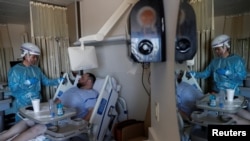The World Health Organization says debilitating post-COVID-19 symptoms in patients will have an impact on global health because of the magnitude of the pandemic.
The World Health Organization is conducting research into why many people who are infected with COVID-19 continue to suffer from various disabling conditions for up to six months after they have had the illness.
The team lead of WHO’s Health Care Readiness Division, Janet Diaz, says some people with post-COVID-19 conditions, also known as “long COVID” have not been able to go back to work. She says their incapacitating symptoms prolong their recovery period.
“Some of the more common symptoms of the post-COVID-19 condition can be fatigue, exertional malaise, and cognitive dysfunction. Sometimes you may be hearing patients describing that as ‘brain fog.’ These are real,” she said.
Other complications include shortness of breath, cough, and mental health and neurological complications. Diaz says it is not clear which patients are most at risk of long COVID. She says they range from patients who have been hospitalized and required intensive care treatment to those with mild illnesses who were treated in ambulatory outpatient settings.
She says researchers do not know why this is happening and are working hard to get the answers to the many questions surrounding this disease, caused by the SARS-CoV-2 virus.
“We are concerned, obviously, with the numbers of patients infected with SARS-CoV-2 virus. … We do not know how common it is or how uncommon it is. But the numbers, just by the magnitude of the pandemic will impact health systems. Again, the main message from us is prevent infection with SARS-CoV-2. So, the public health measures are the No. 1 intervention right now that we know will prevent this," she said.
These measures include observing physical distancing, wearing a mask and handwashing.
WHO is calling for a coordinated global research response and the collection of as much standardized clinical data as possible to better understand the condition and learn how to better treat those afflicted with this complication.





